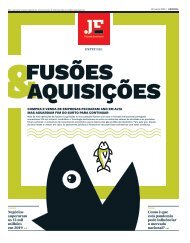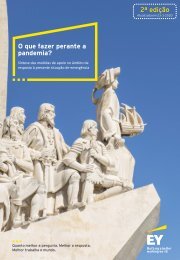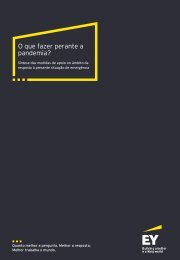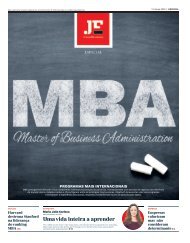EY Government Support Package_Portugal
- No tags were found...
You also want an ePaper? Increase the reach of your titles
YUMPU automatically turns print PDFs into web optimized ePapers that Google loves.
COVID-19:<br />
<strong>Government</strong><br />
<strong>Support</strong> <strong>Package</strong><br />
<strong>Portugal</strong><br />
3 April 2020
2<br />
COVID-19: EMEIA <strong>EY</strong> <strong>Government</strong> <strong>Support</strong> <strong>Package</strong><br />
The purpose of this communication is to briefly describe a set of extraordinary and<br />
temporary measures approved by the Portuguese <strong>Government</strong>, aimed at employees and<br />
employers affected by the outbreak of the COVID-19, with the main objective of supporting<br />
the maintenance of jobs and mitigate situations of business crisis.<br />
The first challenge is to guarantee liquidity in the immediate future. The maintenance of the<br />
income and management of the responsibilities have become crucial aspects of the new<br />
management reality.<br />
Among the main measures and mechanisms currently available to companies to address<br />
shortfalls or treasury restrictions triggered by this period of crisis, and based on the<br />
legislation in force today, we highlight the following:<br />
Areas being addressed:<br />
1. Providing liquidity through financing schemes<br />
2. Business support through removal of fixed<br />
costs and provision of grants<br />
3. Helping employers to protect jobs<br />
4. Cash-flow support, including tax deferrals<br />
5. Administration and governance<br />
For more information<br />
Carlos Lobo<br />
Tax Policy Leader<br />
Carlos.Lobo@pt.ey.com<br />
Tel: +351 937 912 146<br />
Luis Marques<br />
Country Tax Leader<br />
Luis.Marques@pt.ey.com<br />
Tel: +351 937 912 214<br />
6 April 2020 COVID-19: EMEIA <strong>EY</strong> <strong>Government</strong> <strong>Support</strong> <strong>Package</strong>
3<br />
<strong>Portugal</strong> <strong>Government</strong> announced responses<br />
Liquidity and financing<br />
Sector Specific Credit Lines<br />
Helps micro companies, SMEs, small<br />
cap and mid cap companies operating<br />
in specific sectors (namely industry,<br />
tourism and restaurants) affected by<br />
COVID-19 to access bank lending if<br />
required.<br />
The total amount made available will<br />
be €3bn, with companies being able to<br />
apply for a maximum of €1.5m.<br />
Tourism Credit Line<br />
Helps micro companies operating in<br />
the tourism sector affected by COVID-<br />
19 to access bank lending if required.<br />
The total amount made available will<br />
be €60m, with companies being able<br />
to apply for a maximum of €20k.<br />
Short-term financing Capitalizar<br />
2018 | COVID-19<br />
Aimed at companies to manage shortterm<br />
treasury and working capital<br />
needs.<br />
The total amount made available will<br />
be €400m,with companies being able<br />
to apply for a maximum of €1.5m.<br />
Moratorium<br />
Allows borrowers (individuals and any<br />
size company not in the financial<br />
sector) to defer their payment<br />
obligations referring to outstanding<br />
financing. This includes payments of<br />
principal, interest, financial leases<br />
rents, fees and other payment<br />
obligations, including any margin calls<br />
or Lender right to enforce stop losses<br />
clauses, in whole or in part, for a six<br />
month period.<br />
Grants<br />
Employment support<br />
Cash flow support<br />
Advance payments of Financial<br />
Incentives and deferral of<br />
reimbursements<br />
The Portuguese <strong>Government</strong> has<br />
enacted regulation that enables<br />
companies to create liquidity reliefs on<br />
existing Financial Incentives and Grant<br />
contracts.<br />
R&D cash grant schemes<br />
deadlines were postponed<br />
Proposals concerning R&D cash grants<br />
are now available to host projects<br />
concerning R&D of systems and<br />
solutions targeting COVID 19.<br />
The cash grants will vary rom 25% to<br />
75%.<br />
Job retention measures<br />
Immediate extraordinary support for<br />
employers and employees affected by<br />
the outbreak of COVD-19, with the aim<br />
of maintaining jobs and to mitigate the<br />
economic crisis.<br />
Simplified lay off schemes, exemption<br />
of contributions to social security and<br />
financial incentives to support the<br />
normalization of activities are<br />
foreseen and may be applicable.<br />
Tax and social contributions<br />
deferrals<br />
First special payment on account, first<br />
payments on account, and CIT return<br />
are deferred.<br />
Payment of CIT and PIT withholding<br />
taxes, VAT and social security<br />
contributions can be made in partial<br />
instalments.<br />
Tax enforcement proceedings are<br />
suspended until 30 June 2020.<br />
6 April 2020 COVID-19: EMEIA <strong>EY</strong> <strong>Government</strong> <strong>Support</strong> <strong>Package</strong>
4<br />
Liquidity and financing: Sector Specific Credit Lines<br />
The Sector Specific Credit<br />
Lines will provide financing<br />
up to €3,000M to support<br />
short-term treasury and<br />
working capital operations,<br />
although with a medium<br />
reimbursement scheme.<br />
The target sectors are:<br />
€1,300m, Industry<br />
(Textile, Clothing, Footwear,<br />
Extractive Industry and Wood &<br />
Cork)<br />
€900m, Tourism<br />
(developments and<br />
accommodations)<br />
€600m, Restaurants<br />
€200m, Tourism<br />
(travel agencies, animation and<br />
organization of events)<br />
Who is eligible?<br />
These measures are available to micro<br />
companies, SMEs, small cap and mid<br />
cap companies that operate within an<br />
eligible industry sector.<br />
Applicants will need to show:<br />
A statement of positive net situation<br />
in the last approved balance sheet or<br />
negative net situation and<br />
regularization in the approved<br />
interim balance sheet up to the date<br />
of the operation.<br />
Applicants should not be considered<br />
as companies in distress as of 31st<br />
December 2019 according to n.18 of<br />
article 2nd of EU Regulation<br />
n.651/2014 of 17th of June (i.e.<br />
considered as a non performing<br />
Exposure)<br />
Applicants will need to have:<br />
An absence of debts to Social<br />
Security and the Tax Administration<br />
as of 1 March 2020 and a<br />
declaration of regularization of<br />
subsequent debts within 15 days<br />
after the first disbursement;<br />
An absence of incidents not<br />
regularized with financial institutions<br />
and the Mutual Guarantee System<br />
(“MGS”) as at the issuance date; and<br />
A declaration of commitment to<br />
maintain all company jobs until 30<br />
June 2020.<br />
What does it cover?<br />
These credit lines will provide funding to<br />
businesses in sectors particularly<br />
affected by COVID-19.<br />
Maximum size of the loan is €1.5m.<br />
Maximum duration of loan is four years,<br />
with a grace period of one year from<br />
repayments of principal or interest.<br />
Spread rate will be from 1.0% to 1.5%.<br />
MGS will provide a guarantee to the<br />
lender for up to 90% of the facility<br />
value. <strong>Government</strong> will in-turn provide a<br />
counter guarantee of 100% in favor of<br />
MGS.<br />
How is it accessed?<br />
►<br />
►<br />
Full details will be published by the<br />
Portuguese <strong>Government</strong> on a specific<br />
website that is not yet operational.<br />
The credit lines will be made<br />
available by financial institutions.<br />
Practicalities<br />
All companies are subject to a risk<br />
assessment. Therefore, companies will<br />
need to demonstrate that other than<br />
for the COVID-19 disruption, they<br />
would be considered to be viable by the<br />
lender.<br />
Companies will need to demonstrate<br />
the purpose of the loan application and<br />
to ensure that it is directed to the<br />
necessity of cash management and<br />
working capital.<br />
As applications are made directly to the<br />
financial institutions, companies will<br />
need to consider which and how many<br />
lenders to approach in order to give<br />
themselves the best chance of success.<br />
For more information<br />
Nuno Nogueira da Silva<br />
nuno.silva@pt.ey.com<br />
Tel: +351 914 898 793<br />
Tiago Ferreira da Silva<br />
tiago.silva@pt.ey.com<br />
Tel: +351 913 029 150<br />
Francisco Hamilton Pereira<br />
francisco.hamilton-pereira@pt.ey.com<br />
Tel: +351 937 912 749<br />
6 April 2020<br />
COVID-19: EMEIA <strong>EY</strong> <strong>Government</strong> <strong>Support</strong> <strong>Package</strong>
5<br />
Liquidity and financing: Tourism Credit Line<br />
The Tourism Credit Line will<br />
provide financing up to<br />
€60m to support micro<br />
companies that have been<br />
negatively impacted by<br />
COVID-19.<br />
The scheme will support<br />
companies for three<br />
months, being possible to<br />
reimburse it up to three<br />
years. Moreover, the loan<br />
will have no interest due.<br />
Who is eligible?<br />
This measure applies to licensed micro<br />
companies registered on the ‘National<br />
Tourism Records’ and headquartered in<br />
<strong>Portugal</strong>.<br />
Applicants will need to show:<br />
That they have not been subject to<br />
administrative or judicial sanctions<br />
or convicted for illegal dismissal;<br />
That they have an absence of debts<br />
to Social Security, the Tax<br />
Administration and ‘Tourism of<br />
<strong>Portugal</strong>’; and<br />
A company statement on the<br />
negative impact of COVID-19 on its<br />
activity.<br />
Applicants should also not be<br />
considered as companies in distress,<br />
meaning one of the following:<br />
What does it cover?<br />
The credit lines will provide funding to<br />
businesses operating in the tourism<br />
industry affected by COVID-19.<br />
The maximum loan amount is<br />
€750/month for each worker employed<br />
as at 29 February 2020, multiplied for a<br />
period of three months up to a<br />
maximum of €20k per company.<br />
Maximum duration of operation is three<br />
years with a grace period from the<br />
repayment of credit line for one year.<br />
Loan interest rate is 0%.<br />
One of the shareholders must be<br />
personally liable for the facility amount.<br />
Practicalities<br />
Companies will need to demonstrate<br />
that other than for the COVID-19<br />
disruption, they would be considered to<br />
be viable by the lender.<br />
Companies will need to demonstrate<br />
that their business was negatively<br />
impacted by COVID-19.<br />
For companies in existence for at<br />
least 3 years, more than half of its<br />
subscribed capital has been<br />
consumed by accumulated losses;<br />
Has been the subject of insolvency or<br />
complies with the criteria that may<br />
lead its creditors to ask for<br />
insolvency; or<br />
Has received emergency aid and has<br />
not reimbursed the loan, finished the<br />
guarantee or has received a<br />
restructuring aid and is subject to a<br />
restructuring process<br />
How is it accessed?<br />
Full details published by the Portuguese<br />
<strong>Government</strong> on the Republic Diary on<br />
the 25th of March 2020.<br />
The credit lines are managed by<br />
‘Tourism of <strong>Portugal</strong>’, being responsible<br />
for the assessment of applications<br />
during the maximum of five working<br />
days.<br />
For more information<br />
Nuno Nogueira da Silva<br />
nuno.silva@pt.ey.com<br />
Tel: +351 914 898 793<br />
Tiago Ferreira da Silva<br />
tiago.silva@pt.ey.com<br />
Tel: +351 913 029 150<br />
Francisco Hamilton Pereira<br />
francisco.hamilton-pereira@pt.ey.com<br />
Tel: +351 937 912 749<br />
6 April 2020 COVID-19: EMEIA <strong>EY</strong> <strong>Government</strong> <strong>Support</strong> <strong>Package</strong>
6<br />
Liquidity and financing: Capitalizar 2018 | COVID-19<br />
Capitalizar 2018 | COVID-<br />
19 Line will provide<br />
financing up to €400m to<br />
support operations<br />
negatively affected by<br />
COVID-19.<br />
This line is managed by<br />
‘PME Investimentos’ in<br />
partnership with the<br />
Banking sector and the<br />
Mutual Guarantee System.<br />
The funds provided are<br />
targeted to:<br />
€320m, Working<br />
Capital Management<br />
(through medium-short term<br />
loans)<br />
€80m, Treasury<br />
Management<br />
(through the opening of credit<br />
on a current account)<br />
Who is eligible?<br />
This measure applies to:<br />
Micro companies and SMEs certified<br />
by IAPMEI, or large companies<br />
headquartered in <strong>Portugal</strong>;<br />
Companies that within an eligible<br />
industry sector (this is a large list,<br />
and excludes the sectors with<br />
specific credit lines and financial<br />
institutions);<br />
For large companies, the business<br />
credit rating must be comparable to<br />
“B-”; and<br />
For individuals with organized<br />
accounts and companies without one<br />
year of activity, a risk rating of “C”.<br />
Applicants will need to show:<br />
A statement of positive net situation<br />
in the last approved balance sheet or<br />
negative net situation and<br />
regularization in the approved<br />
interim balance sheet up to the date<br />
of the operation;<br />
An absence of debts to Social<br />
Security, the Tax Administration and<br />
FINOVA as of the date of the<br />
contractual agreement; and<br />
An absence of unsettled balances<br />
with the financial sector.<br />
What does it cover?<br />
The credit lines will provide funding to<br />
businesses to help manage treasury and<br />
working capital needs.<br />
Maximum loan amount is €1.5M.<br />
The period of utilization is one year for<br />
working capital and flexible for treasury<br />
management.<br />
The maximum period for repayment is<br />
four years for working capital (with a<br />
grace period for repayment of one year)<br />
and one to three years to treasury<br />
management<br />
The applicant can choose between a<br />
fixed rate scheme (Euribor swap +<br />
spread) or variable rate scheme<br />
(Euribor 1,3,6 or 12 months + spread),<br />
however the financial institution will<br />
define the spread interest rate, being<br />
between 1.928% for working capital and<br />
1.943% for treasury management to<br />
3.278%<br />
MGS will provide a guarantee to the<br />
lender for up to 80% of facility value.<br />
How is it accessed?<br />
Full details were published by the<br />
Portuguese <strong>Government</strong> on 27 March<br />
2020.<br />
The credit lines are made available<br />
through financial institutions.<br />
Practicalities<br />
All financial operations are subject to a<br />
risk assessment. Therefore, companies<br />
will need to demonstrate that other<br />
than for the COVID-19 disruption, they<br />
would be considered to be viable by the<br />
lender.<br />
Companies will need to demonstrate<br />
the aim for the loan application,<br />
ensuring it is directed to necessity of<br />
cash management and working capital<br />
needs.<br />
Companies will need to review how to<br />
demonstrate their credit strength.<br />
Companies will need to consider which<br />
and how many lenders to approach and<br />
how to give themselves the best chance<br />
of success.<br />
For more information<br />
Nuno Nogueira da Silva<br />
nuno.silva@pt.ey.com<br />
Tel: +351 914 898 793<br />
Tiago Ferreira da Silva<br />
tiago.silva@pt.ey.com<br />
Tel: +351 913 029 150<br />
Francisco Hamilton Pereira<br />
francisco.hamilton-pereira@pt.ey.com<br />
Tel: +351 937 912 749<br />
6 April 2020 COVID-19: EMEIA <strong>EY</strong> <strong>Government</strong> <strong>Support</strong> <strong>Package</strong>
7<br />
Liquidity and financing: Moratorium<br />
The moratorium allows the<br />
deferment of relevant<br />
payments referring to<br />
outstanding financing.<br />
The suspension will result in<br />
the rescheduling of the<br />
payment amounts without<br />
any costs or expenses<br />
(other than the applicable<br />
interest rate which shall<br />
accrue and be compounded<br />
by reference to the date<br />
these are not paid).<br />
Who is eligible?<br />
This measure applies to:<br />
Micro-companies, SME’s and any<br />
other company, except any company<br />
integrated in the financial sector,<br />
operating in <strong>Portugal</strong>; and<br />
Individuals in relation to residential<br />
loans for primary residence.<br />
Applicants must:<br />
Not have an outstanding payment<br />
breach or default before an<br />
applicable lender for more than 90<br />
days as of 18 March 2020 or, if the<br />
borrower is under an outstanding<br />
default, the following conditions do<br />
not apply:<br />
i. the materiality criteria<br />
established in Notice no. 2/2019,<br />
of the Bank of <strong>Portugal</strong> and in<br />
Regulation no. 18/1845, of the<br />
European Central Bank is not<br />
satisfied; and<br />
ii.<br />
the borrower is not insolvent, in a<br />
situation of suspension of<br />
payments or already under<br />
enforcement by any of the<br />
lenders on such date;<br />
Have an absence of debts to Social<br />
Security and the Tax Administration<br />
as of 1 March 2020.<br />
What does it cover?<br />
The moratorium entitles eligible<br />
borrowers / beneficiaries to defer the<br />
relevant payment obligations (principal,<br />
interest, financial leases rents, fees and<br />
other payment obligations, including<br />
any margin calls or Lender right to<br />
enforce stop losses clauses), in whole or<br />
in part, during a 6 month period.<br />
It includes a special regime which<br />
foresees the possibility of the<br />
Portuguese State and other public<br />
entities to provide guarantees within<br />
the limits established in the budget law<br />
which may guarantee any financings.<br />
It also includes the possibility of the<br />
mutual guarantee companies to grant<br />
guarantees to the extent that the<br />
provision of this guarantee is authorized<br />
by the <strong>Government</strong><br />
How is it accessed?<br />
Full details published by the Portuguese<br />
<strong>Government</strong> on the Republic Diary on<br />
26 March 2020.<br />
Practicalities<br />
The borrower will need to deliver to the<br />
Lender a letter of adherence to the<br />
regime, accompanied by declarations<br />
from the Portuguese Tax Authority and<br />
the Portuguese Social Security<br />
confirming the absence of amounts<br />
outstanding.<br />
Upon receipt of the letter, Lenders are<br />
required to apply the Decree-Law<br />
protection within 5 business days. If it is<br />
determined that the requirements have<br />
not been met, the Lender shall inform<br />
the borrower within 3 business days<br />
following the delivery of the<br />
documentation.<br />
For more information<br />
Nuno Nogueira da Silva<br />
nuno.silva@pt.ey.com<br />
Tel: +351 914 898 793<br />
Tiago Ferreira da Silva<br />
tiago.silva@pt.ey.com<br />
Tel: +351 913 029 150<br />
Francisco Hamilton Pereira<br />
francisco.hamilton-pereira@pt.ey.com<br />
Tel: +351 937 912 749<br />
6 April 2020 COVID-19: EMEIA <strong>EY</strong> <strong>Government</strong> <strong>Support</strong> <strong>Package</strong>
8<br />
Existing Financial Incentives and Grants<br />
Financial Incentives include<br />
non reimbursable incentives<br />
(i.e. grants) and interest<br />
free reimbursable loans for<br />
companies.<br />
The COVID-19 crisis is<br />
causing a liquidity shortfall<br />
in companies and the<br />
Portuguese <strong>Government</strong> is<br />
mitigating such impact by<br />
reducing the pressures on<br />
existing grants and interest<br />
free loans.<br />
Moreover, the KPIs of<br />
existing projects may be<br />
adjusted in order to<br />
discount the effects of the<br />
COVID-19 crisis.<br />
New packages of grants for<br />
COVID-19 related activities<br />
may be enacted.<br />
<strong>Government</strong> Advance payments<br />
of Financial Incentives<br />
Settlement for the payments of financial<br />
incentives will be carried out in shortest<br />
possible timeframe, after the<br />
submission of the relevant request by<br />
the companies. In addition, companies<br />
may also request advance payments of<br />
financial incentives, i.e., before the<br />
financial incentive is computed.<br />
Deferral of financial incentives<br />
reimbursements<br />
It is now possible to defer upcoming<br />
payment instalments due until 30<br />
September, with respect to the<br />
reimbursement of non interest bearing<br />
loans for a period up to 12 months.<br />
Impacts on the evaluation of<br />
KPIs<br />
The negative impacts to projects<br />
under the “<strong>Portugal</strong> 2020” program<br />
resulting from the COVID-19 outbreak,<br />
may be considered a force majeure<br />
reason for non-compliance with the<br />
project’s objectives.<br />
Practical considerations<br />
These measures do not require<br />
additional formalities to pre-existing<br />
procedures and may be implemented<br />
with the existing mechanisms.<br />
Practical considerations<br />
This deferral can be made without<br />
penalties or sanctions.<br />
Practical considerations<br />
This measure enables the beneficiaries<br />
to re-negotiate the financial incentives<br />
agreement, provided that the company<br />
informs the responsible entity of<br />
relevant disruptions due to the virus<br />
outbreak.<br />
Expenses on cancelled events<br />
The expenses already incurred with<br />
respect to cancelled or delayed events<br />
due to the COVID-19 outbreak would<br />
continue to be eligible.<br />
Practical considerations<br />
Such expenses will only be granted if<br />
they were already included in the<br />
investment approved<br />
For more information<br />
Francisco Hamilton Pereira<br />
francisco.hamilton-pereira@pt.ey.com<br />
Tel: +351 937 912 749<br />
6 April 2020 COVID-19: EMEIA <strong>EY</strong> <strong>Government</strong> <strong>Support</strong> <strong>Package</strong>
9<br />
Grants: R&D projects<br />
<strong>Portugal</strong> has a very<br />
competitive R&D cash Grant<br />
scheme under the program<br />
“<strong>Portugal</strong> 2020”.<br />
Several proposals have<br />
been extended in order to<br />
included R&D projects that<br />
may target solutions to help<br />
health services to use<br />
against COVID-19.<br />
These Grants are funded<br />
through EU programs<br />
managed by the local<br />
entities and partially by the<br />
Portuguese <strong>Government</strong>.<br />
R&D Cash Grant Consortium<br />
Projects – All territory<br />
Companies<br />
25%-75% cash grant on eligible R&D<br />
expenses (note that entities located<br />
in Lisbon will be limited to 50%).<br />
Universities and Tech centers<br />
75% cash grant<br />
R&D Cash Grant Consortium<br />
Projects – Low density areas<br />
Companies<br />
25%-75% cash grant on eligible R&D<br />
expenses.<br />
Universities and Tech centers<br />
75% cash grant.<br />
Practical considerations<br />
To obtain the Grant, Consortiums need<br />
to prepare and submit an application.<br />
The deadline for the call for proposals<br />
was extended to 19 May 2020.<br />
Special attention will paid to projects<br />
developing solutions that may be used<br />
to fight against COVID-19.<br />
Practical considerations<br />
To obtain the Grant, Consortiums need<br />
to prepare and submit na application.<br />
There are 3 deadlines for these<br />
proposals, benig 15 May, 15 July and<br />
15September 2020.<br />
Special attention will paid to projects<br />
developing solutions that may be used<br />
to fight against COVID-19.<br />
R&D Cash Grant European<br />
Consortium Projects<br />
Companies<br />
25%-75% cash grant on eligible R&D<br />
expenses (note that entities located<br />
in Lisbon will be limited to 50%).<br />
Technical Universities<br />
75% cash grant<br />
Practical considerations<br />
Consortiums between Companies in<br />
<strong>Portugal</strong> and European technical<br />
universities.<br />
To obtain the Grant, Consortiums need<br />
to prepare and submit na application.<br />
The deadline for the proposals was<br />
extended to 30 April 2020.<br />
Special attention will paid to projects<br />
developing solutions that may be used<br />
to fight against COVID-19.<br />
For more information<br />
Francisco Hamilton Pereira<br />
francisco.hamilton-pereira@pt.ey.com<br />
Tel: +351 937 912 749<br />
6 April 2020 COVID-19: EMEIA <strong>EY</strong> <strong>Government</strong> <strong>Support</strong> <strong>Package</strong>
10<br />
Employment support: Exceptional measures to<br />
protect employment<br />
Companies facing a<br />
business crisis situation are<br />
entitled to the following<br />
benefits:<br />
<br />
<br />
<br />
<br />
Financial aid, per<br />
employee, aimed to<br />
support the payment of<br />
wages and the<br />
continuity of the<br />
employment contracts,<br />
with or without training;<br />
Exceptional training<br />
plan;<br />
Exceptional financial aid<br />
to support the<br />
normalization of<br />
business activity; and<br />
Temporary exemption<br />
from SS contributions<br />
(on the employer part).<br />
During the period of validity<br />
of these measures as well<br />
as in the 60 following days,<br />
employers are not allowed<br />
to dismiss employees under<br />
a collective dismissal or an<br />
extinction of the labor<br />
position. Several other<br />
requirements need to be<br />
met.<br />
Who is eligible?<br />
The scheme will be open to companies<br />
facing a business crisis situation, which<br />
can include:<br />
Situations of complete or partial stop<br />
of the business activity of a company<br />
or establishment, due to the<br />
lockdown enforced by Decree-Law 2-<br />
A/2020, or by legislative or<br />
administrative decision;<br />
By means of a statement issued by<br />
the employer and certified by its<br />
Certified Accountant, in the following<br />
situations:<br />
(i) Complete or partial stop of the<br />
business activity of a company or<br />
establishment, due to<br />
interruption of the supply chain<br />
or cancelation of purchase<br />
orders; or<br />
(ii) Sudden reduction of at least 40%<br />
of turnover in the 30 days period<br />
prior to the request, with<br />
reference to the monthly average<br />
of the two previous months or the<br />
same period of the prior year or,<br />
for taxpayers that have began<br />
their activity less than 12 months<br />
ago, to the average of the period<br />
of activity.<br />
What does it cover?<br />
Financial aid to keep employment<br />
contracts:<br />
Employees are entitled to<br />
remuneration corresponding to 2/3<br />
of the employee’s gross salary,<br />
capped at €1,905 (equivalent to 3<br />
times the national minimum wage).<br />
Term: 1 month, extendable for<br />
additional months (up to 3 months).<br />
Exceptional training plan:<br />
The exceptional support to be<br />
granted to each employee is<br />
supported by IEFP, I. P. and takes<br />
into consideration the hours of<br />
vocational training attended by the<br />
employee, up to the limit of 50% of<br />
the employee’s remuneration, up to<br />
a maximum of €635.<br />
Note that the exceptional training<br />
plan aid cannot be applied for by<br />
those entitled to apply for the<br />
financial aid to keep employment<br />
contracts.<br />
Financial aid for the support of the<br />
normalization of business activity:<br />
Financial aid paid in one single<br />
instalment in the amount of €635<br />
per employee;<br />
To access to this incentive, the<br />
employer shall file a request to IEFP,<br />
I.P., together with a declaration from<br />
the employer that certifies the<br />
situation of business crisis and a<br />
certificate issued by the certified<br />
accountant of the company.<br />
Practicalities<br />
The employer must have its<br />
obligations and debts towards the<br />
Social Security and Portuguese Tax<br />
Authority settled;<br />
The employer must communicate to<br />
the employees, in writing, on the<br />
decision to obtain the financial aid,<br />
including the expected duration;<br />
The employee representation body<br />
(if one exists) should be notified and<br />
their position taken into account;<br />
An application must be immediately<br />
sent to the Social Security<br />
Authorities (Form RC3056-DGSS),<br />
together with a statement from the<br />
employer with a conclusion from the<br />
Certified accountant on the existing<br />
business crisis, and a list of<br />
employees and their social security<br />
numbers.<br />
For more information<br />
Anabela Silva<br />
Anabela.silva@pt.ey.com<br />
Tel: +351 936 079 620<br />
6 April 2020 COVID-19: EMEIA <strong>EY</strong> <strong>Government</strong> <strong>Support</strong> <strong>Package</strong>
11<br />
Employment support: Deferral of Social Security<br />
Contributions<br />
Possibility to apply the<br />
deferral of the payment of<br />
Social Security<br />
Contributions (employer’s<br />
part) for the months of<br />
March, April and May 2020.<br />
In case of employers that<br />
have already paid in full for<br />
the month of March, the<br />
deferral is applicable for the<br />
period from April to June<br />
2020.<br />
Who is eligible?<br />
The scheme will be open to the<br />
following:<br />
Self-employees.<br />
Employers with less than 50<br />
employees;<br />
Employers with 50 up to 249<br />
employees, as long as they have<br />
suffered a loss of at least 20% in the<br />
amount of revenues invoiced by the<br />
company as reported in the E-invoice<br />
system in the months of March, April<br />
and May 2020, or in the same period<br />
of the previous year or, in case of<br />
employers that have began their<br />
activity less than 12 moths ago, to<br />
the average of the period of activity;<br />
What does it cover?<br />
The social security (“SS”) contributions<br />
(on the employer part) of eligible<br />
entities due for the months of March,<br />
April and May 2020 can be paid in the<br />
following terms:<br />
<br />
<br />
1/3 of the SS contributions in the<br />
month they are due;<br />
The remaining 2/3 in equal<br />
instalments in the months of July,<br />
August and September 2020 or in<br />
the months from July to December,<br />
without interest.<br />
Practicalities<br />
The deferral is automatic (i.e. the use of<br />
the benefit is notified by the employer<br />
in the Social Security Website –<br />
“Segurança Social Direta and must be<br />
made before the payment is due).<br />
Companies need to pay 1/3 in the<br />
month they are due.<br />
The proof of loss in the amounts<br />
invoiced by the company should be<br />
certified by a Certified Accountant.<br />
The number of employees is determined<br />
by reference to the Monthly income<br />
Statement for February 2020.<br />
Employers with 250 or more<br />
employees, as long as they have<br />
suffered a loss of at least 20% in the<br />
amount of revenues invoiced by the<br />
company as reported in the E-invoice<br />
system in the months of March, April<br />
and May 2020, or in the same period<br />
in the previous year or, in case of<br />
employers that have began their<br />
activity less than 12 moths ago, to<br />
the average of the period of activity,<br />
and the company falls into one of the<br />
following categories of taxpayers: (i)<br />
private welfare institutions or<br />
equivalents; (ii) employers operating<br />
in sectors covered by the lockdown<br />
(i.e. leisure, cultural, artistic, sports,<br />
open space, games and gambling,<br />
and restoration activities), or in the<br />
sectors of aviation or tourism; (iii)<br />
the activity of the employers has<br />
been suspended by legislative or<br />
administrative decision;<br />
For more information<br />
Anabela Silva<br />
Anabela.silva@pt.ey.com<br />
Tel: +351 936 079 620<br />
6 April 2020 COVID-19: EMEIA <strong>EY</strong> <strong>Government</strong> <strong>Support</strong> <strong>Package</strong>
12<br />
Employment support: Deferral of Personal Income<br />
Tax withholdings<br />
Possibility to apply the<br />
deferral of the Personal<br />
Income Tax (“PIT”)<br />
withholdings due in the<br />
second trimester of 2020.<br />
Who is eligible?<br />
The scheme will be open to the<br />
following:<br />
Taxpayers with a turnover up to<br />
€10m in 2018;<br />
Taxpayers who operate in sectors<br />
covered by the lockdown (i.e. leisure,<br />
cultural, artistic, sports, open space,<br />
games and gambling, and<br />
restoration activities);<br />
Taxpayers who have began their<br />
activity in or after 1 January 2019.<br />
Note that taxpayers not mentioned<br />
above may also benefit from this<br />
deferral, in instances where they report<br />
and demonstrate a loss of at least 20%<br />
(compared to the averaged of the 3<br />
months prior to the month at stake,<br />
versus the same period in the previous<br />
year), in the amount of revenues<br />
invoiced by the company as reported in<br />
the E-invoice system.<br />
What does it cover?<br />
For eligible entities, the taxpayer may<br />
elect for the payment of PIT<br />
withholdings, due in the second<br />
trimester of 2020, to be fulfilled in one<br />
of the following ways:<br />
Immediate payment, under general<br />
terms; or<br />
Payment in instalments (in three or<br />
six monthly instalments) without<br />
interest.<br />
Practicalities<br />
The requests for payments in<br />
instalments should be performed<br />
electronically, up to the legal deadline<br />
for payment (being the 20th of the<br />
following month).<br />
The proof of loss in the amounts<br />
invoiced by the company should be<br />
certified by a Statutory Auditor or by a<br />
Certified Accountant.<br />
For more information<br />
Anabela Silva<br />
Anabela.silva@pt.ey.com<br />
Tel: +351 936 079 620<br />
6 April 2020 COVID-19: EMEIA <strong>EY</strong> <strong>Government</strong> <strong>Support</strong> <strong>Package</strong>
13<br />
Other employment issues<br />
A “State of Emergency”<br />
was announced on 18<br />
March, with a call for<br />
everybody to stay at home<br />
and only to leave for<br />
specific reasons. Travelling<br />
to and from work is only<br />
allowed if it is “absolutely<br />
necessary”. <strong>Government</strong><br />
advice is that employees<br />
who can work from home<br />
should do so.<br />
Closing of schools<br />
Absences shall be deemed justified for<br />
employees who have to stay at home<br />
due to the closing of schools and who<br />
cannot resort to teleworking, where the<br />
children are:<br />
Under 12 years of age; or,<br />
If regardless of their age, they have a<br />
disability or chronic disease.<br />
In this case, exceptional financial<br />
support will be granted to employees in<br />
the amount of 2/3 of their base salary.<br />
This amount will be supported by the<br />
employer and Social Security in equal<br />
parts (i.e. 33% by the employer and 33%<br />
by Social Security).<br />
This financial support has a minimum<br />
limit of €635 and maximum of €1,905.<br />
The financial support is automatically<br />
granted, at the request of the employer.<br />
This financial support cannot be<br />
received by both parents regardless of<br />
the number of children they care for.<br />
Practical considerations<br />
Employees need to send to their<br />
employers a statement with the:<br />
Identification of their children;<br />
The period of absence from work;<br />
and<br />
Confirmation that the other parent<br />
did not benefit from the same<br />
allowance.<br />
Employers will need to file an<br />
application on-line through the Social<br />
Security’s webpage.<br />
Impediment to work due to the<br />
risk of contagion<br />
If the employee possesses a notice of<br />
prophylactic isolation issued by the<br />
Health Authority, he/she is entitled to<br />
receive:<br />
An allowance corresponding to 100%<br />
of their salary, for the initial 14 days;<br />
An allowance between 55% and 75%<br />
(depending on the duration of the<br />
sick leave) of their salary in the<br />
subsequent periods.<br />
Practical considerations<br />
This benefit is not applicable to<br />
employees who are able to perform<br />
their duties through teleworking or<br />
distance learning. The payment of this<br />
allowance is not subject to a guarantee<br />
period, job index or waiting period.<br />
Employees should send a notice of<br />
prophylactic isolation issued by the<br />
Health Authority to their employer and<br />
the employer should send it to the<br />
Social Security Authorities within 5<br />
days.<br />
For more information<br />
Anabela Silva<br />
Anabela.silva@pt.ey.com<br />
Tel: +351 936 079 620<br />
Rodrigo Lourenço<br />
rodrigo.lourenco@rrp.pt<br />
6 April 2020 COVID-19: EMEIA <strong>EY</strong> <strong>Government</strong> <strong>Support</strong> <strong>Package</strong>
14<br />
Other employment issues<br />
A “State of Emergency”<br />
was announced on 18<br />
March, with a call for<br />
everybody to stay at home<br />
and only to leave for<br />
specific reasons. Travelling<br />
to and from work is only<br />
allowed if it is “absolutely<br />
necessary”. <strong>Government</strong><br />
advice is that employees<br />
who can work from home<br />
should do so.<br />
Sickness due to COVID-19<br />
If an employee is infected with the virus<br />
and has a certificate of temporary<br />
incapacity for work (commonly known<br />
as “sick leave”), he/she is entitled to a<br />
sickness allowance paid by Social<br />
Security, ranging from 55% to 75% of<br />
their salary (depending on the duration<br />
of the sick leave).<br />
Justified absences<br />
These include absences for the support<br />
of:<br />
Children under 12 years old or,<br />
independently from their age, in case<br />
they have a chronic disease or<br />
disability, as well as grandchildren (in<br />
certain cases), during Easter break.<br />
A spouse or partner, parent or other<br />
dependent living with the employee<br />
(in case these individuals are living in<br />
an elderly care home that is closed<br />
by decision of the Health Authority of<br />
the <strong>Government</strong>; and<br />
Firemen involved in rescue and<br />
transportation activities in the<br />
subsequent periods.<br />
Working from home<br />
Both the employer and the employee<br />
can unilaterally decide to work from<br />
home, without the need for consent<br />
from the other party, as long as this is<br />
compatible with the job.<br />
Practical considerations<br />
The temporary incapacity certificate is<br />
issued by the hospital where the person<br />
who is infected with COVID-19 virus is<br />
hospitalized.<br />
Practical considerations<br />
These absences are not paid for by the<br />
employer, but are also not included<br />
within the maximum yearly limit of<br />
justified absences for family support.<br />
As an alternative to unpaid justified<br />
absences, employees (except those<br />
drafted to essential services, pursuant<br />
to art. 10.º of Decree-Law 10-A/2020,<br />
of 13/03) may unilaterally schedule<br />
unused paid vacations for the days in<br />
question, by giving two day written<br />
notice to the employer before the<br />
vacation. In such cases, holiday<br />
allowance may be paid until 4 months<br />
after the start of vacation use.<br />
Practical considerations<br />
Employers should ensure working from<br />
home (“teletrabalho” ) is reported to<br />
Social Security and to the insurance<br />
company for purposes of occupational<br />
accidents.<br />
Employers should be mindful of the duty<br />
to protect employees privacy.<br />
For more information<br />
Anabela Silva<br />
Anabela.silva@pt.ey.com<br />
Tel: +351 936 079 620<br />
Rodrigo Lourenço<br />
rodrigo.lourenco@rrp.pt<br />
6 April 2020 COVID-19: EMEIA <strong>EY</strong> <strong>Government</strong> <strong>Support</strong> <strong>Package</strong>
15<br />
Employment support: Extraordinary training plan<br />
The <strong>Government</strong> will<br />
provide grants based on the<br />
quantity of training hours<br />
provided, limited to 50% of<br />
the gross employees’<br />
remuneration, capped at<br />
Euro 635. There is no limit<br />
on the funding available.<br />
Exemption of social security<br />
contributions due by the<br />
employer during the<br />
extraordinary training plan<br />
period.<br />
The scheme will be in place<br />
for at least three months,<br />
until 30 June 2020, but<br />
may be extended if deemed<br />
needed by the <strong>Government</strong>.<br />
If the measure is applied,<br />
there are severe<br />
restrictions to the dismissal<br />
any of its employees<br />
(covered or not by the<br />
measure). Distribution of<br />
profits under any form is<br />
also forbidden during the<br />
term of the measure.<br />
Who is eligible?<br />
Employers in situation of crisis and<br />
respective employees, when one of the<br />
following conditions applies:<br />
►<br />
►<br />
Complete or partial mandatory close<br />
down of the company or<br />
establishment, as determined by<br />
legal or administrative order;<br />
Complete or partial closing down of<br />
the company or establishment, as a<br />
result of (i) the interruption of global<br />
supply chains; or (ii) the<br />
suspension/cancelation of orders or<br />
reservations (duly documented) that<br />
leads to a reduction of at least 40%<br />
on production or occupation capacity<br />
in the month following the one of the<br />
request for support;<br />
► Turnover reduction of at least 40%<br />
on the 30 days prior to the filing of<br />
the request when compared to:<br />
►<br />
►<br />
Monthly average of the 2 months<br />
prior to the one of the request;<br />
The corresponding period of the<br />
previous year;<br />
► For companies with less than 12<br />
months of activity, the average of<br />
the activity period.<br />
It should be noted that the support for<br />
the existence of a crisis situation may<br />
be inspected by the State services and<br />
official bodies.<br />
What does it cover?<br />
►<br />
►<br />
Financial support: The total amount<br />
of the financial aid is computed<br />
based on the quantity of training<br />
hours provided, limited to 50% of the<br />
gross employees’ remuneration,<br />
capped at €635.<br />
Period: 1 month, non-extendable.<br />
The funds provided will be grants, not<br />
loans.<br />
Which complementary measures<br />
are in place?<br />
►<br />
►<br />
Financial support to the<br />
normalization of companies’<br />
activities (single contribution of Euro<br />
635 per employee);<br />
Exemption of social security<br />
contributions due by the employer<br />
during the extraordinary training<br />
plan period.<br />
The funds provided will be grants, not<br />
loans. Exemptions are definite, not<br />
deferrals.<br />
For more information<br />
Pedro Paiva<br />
pedro.paiva@pt.ey.com<br />
Tel: +351 936 615 043<br />
Practicalities<br />
Companies benefitting from this aid<br />
must communicate to the employees, in<br />
written, on the decision to implement<br />
an employees’ training program,<br />
subject to approval of IEFP, IP. The<br />
financial aid entails the continuity of<br />
employment agreements and is paid by<br />
IEFP, IP.<br />
Simplified lay off and extraordinary<br />
training plan financial support<br />
measures are mutually exclusive.<br />
Failure to comply with any conditions<br />
implies an immediate annulation of the<br />
support and the obligation to repay the<br />
amounts already received or exempted.<br />
Francisco Hamilton Pereira<br />
francisco.hamilton-pereira@pt.ey.com<br />
Tel: +351 937 912 749<br />
6 April 2020 COVID-19: EMEIA <strong>EY</strong> <strong>Government</strong> <strong>Support</strong> <strong>Package</strong>
16<br />
Cash flow support: Corporate income tax deferrals<br />
No application needs to be<br />
made for the envisaged<br />
deferral of corporate<br />
income tax (“CIT”).<br />
Tax payments<br />
The set of measures and mechanisms<br />
that facilitate the compliance with the<br />
tax reporting obligations payments<br />
include:<br />
Deferral of the deadline for the first<br />
instalment of the Special Payment on<br />
Account ("Pagamento Especial por<br />
Conta"), from 31 March 2020 to 30<br />
June 2020;<br />
Extension of the deadline to file the<br />
CIT return ("Modelo 22") for FY19,<br />
from 31 May 2020 to 31 July 2020;<br />
and<br />
Deferral of the deadline for the first<br />
instalment of the Payment on<br />
Account ("Pagamento por Conta")<br />
and Additional Payment on Account<br />
of the CIT ("Pagamento Adicional por<br />
Conta"), from 31 July 2020 to 31<br />
August 2020.<br />
Practical considerations<br />
It should be noted that there are still no<br />
specific measures with respect to<br />
entities that adopt a fiscal year different<br />
from the calendar year. We expect<br />
further clarifications on this matter to<br />
be issued soon.<br />
For companies that, despite the<br />
envisaged measures, continue to face<br />
treasury restrictions that do not allow<br />
the full settlement of CIT and PIT due in<br />
2020, it will be possible for them to<br />
apply for the payment of taxes in<br />
instalments under a general regime<br />
already available and enacted within the<br />
terms defined in Decree-Law no.<br />
492/88.<br />
In general terms, this option is available<br />
for taxpayers whose economic position<br />
does not allow them to settle their<br />
liabilities within the legally established<br />
deadlines or, in certain situations, if<br />
justified by exceptional circumstances<br />
or public interest.<br />
For more information<br />
Pedro Paiva<br />
pedro.paiva@pt.ey.com<br />
Tel: +351 936 615 043<br />
João de Sousa<br />
joao.sousa@pt.ey.com<br />
Tel: +351 937 949 305<br />
6 April 2020 COVID-19: EMEIA <strong>EY</strong> <strong>Government</strong> <strong>Support</strong> <strong>Package</strong>
17<br />
Cash flow support: Flexibility on the payment of<br />
taxes<br />
The <strong>Government</strong> has<br />
decided to make the<br />
payment of taxes and social<br />
security contributions more<br />
flexible, as well as to<br />
determine the suspension,<br />
until 30 June 2020, of tax<br />
enforcement proceedings in<br />
progress or that may be<br />
performed by the Tax<br />
Authority and Social<br />
Security.<br />
Who is eligible?<br />
These measures are available to:<br />
Taxpayers with a turnover of up to<br />
€10m in 2018;<br />
Taxpayers whose activity falls within<br />
the sectors closed under the<br />
<strong>Government</strong> decision (i.e. leisure,<br />
cultural, artistic, sports, open space,<br />
games and gambling, and<br />
restoration activities);<br />
Taxpayers who started their activity<br />
on or after 1 January 2019;<br />
Taxpayers who have resumed<br />
activity on or after 1 January 2019,<br />
when no turnover was obtained in<br />
2018; and<br />
Other taxpayers, not covered by the<br />
general conditions, that declare and<br />
demonstrate a reduction in the<br />
revenue turnover as per invoicing<br />
communicated through the official<br />
platform of the Portuguese Tax<br />
Authority (“E-Fatura”) of at least<br />
20% in the average of the three<br />
months preceding the month in<br />
which this obligation exists,<br />
compared to the same period of the<br />
previous year.<br />
What does it cover?<br />
This measure covers:<br />
VAT payments (either on a monthly<br />
or quarterly basis);<br />
Payments to the State of both<br />
personal and corporate income<br />
withholding taxes.<br />
How does it apply?<br />
In April, May and June, on the due date<br />
of the obligation, the taxpayer may<br />
choose to make the payment in one of<br />
the following ways:<br />
Immediate payment, as normal; or<br />
Payment in three or six monthly<br />
instalments without interest.<br />
In case of payment in instalments, the<br />
payment schedule will be the following:<br />
First instalment is due in the ordinary<br />
due date for the respective payment;<br />
Remaining instalments are due in the<br />
same day of the following months.<br />
In case of payment made in instalments,<br />
there is no need to present guarantees.<br />
Also, no penalties will be applied.<br />
Practicalities<br />
Requests for payments to be made<br />
in monthly installments can be<br />
submitted electronically to the<br />
Portuguese Tax Authority (through<br />
the taxpayers account on the official<br />
portal – Portal das Finanças), until<br />
the end of the voluntary payment<br />
period.<br />
The demonstration of the reduction<br />
in the turnover, when applicable,<br />
must be carried out by certification<br />
of statutory auditor or certified<br />
accountant.<br />
When the automatic communication<br />
of invoice elements through the<br />
official platform of the Portuguese<br />
Tax Authority (“E-Fatura”) does not<br />
reflect the totality of the<br />
transactions carried out subject to<br />
VAT, even if exempt, related to the<br />
transmission of goods and services,<br />
referring to the periods under<br />
analysis, the verification of the<br />
billing reduction must be carried out<br />
with reference to turnover and duly<br />
certified by the statutory auditor or<br />
the certified accountant.<br />
For more information<br />
Pedro Paiva<br />
João de Sousa<br />
pedro.paiva@pt.ey.com<br />
joao.sousa@pt.ey.com<br />
Tel: +351 936 615 043<br />
Tel: +351 937 949 305<br />
6 April 2020 COVID-19: EMEIA <strong>EY</strong> <strong>Government</strong> <strong>Support</strong> <strong>Package</strong>
18<br />
Cash flow support: Cash tax management<br />
The <strong>Government</strong>’s<br />
announcements are not the<br />
only ways to manage cash<br />
tax. There are other tax<br />
related measures, which are<br />
not specific to COVID-19,<br />
which can be used to<br />
manage liquidity.<br />
Tax payments<br />
Taxpayers can review tax instalment<br />
payments for the current year and if<br />
appropriate, claim repayments.<br />
They can also review payments already<br />
made to see if repayments can be<br />
generated. In particular, they can<br />
consider revisiting applicable tax<br />
benefits and incentives for both current<br />
and prior periods that may generate tax<br />
repayments.<br />
Practical considerations<br />
Taxpayers should contact the<br />
Portuguese Tax Authority and look to<br />
submit amended returns and claim<br />
refunds of overpayments as soon as<br />
possible.<br />
They will need to model the impact of<br />
withholding taxes on any cross-border<br />
flows and consider the tax impact of<br />
changes to operating models or supply<br />
chains.<br />
For more information<br />
Pedro Paiva<br />
pedro.paiva@pt.ey.com<br />
Tel: +351 936 615 043<br />
João de Sousa<br />
joao.sousa@pt.ey.com<br />
Tel: +351 937 949 305<br />
Research and development tax<br />
credits<br />
Where appropriate, Taxpayers should be<br />
optimizing and accelerating the<br />
submission of R&D claims in order to<br />
receive cash back as soon as possible.<br />
Practical considerations<br />
Research and development expenditure<br />
credit (“RDEC”) claims can be reviewed<br />
and repayments authorized separately<br />
from a company’s overall tax affairs.<br />
For more information<br />
Pedro Paiva<br />
pedro.paiva@pt.ey.com<br />
Tel: +351 936 615 043<br />
Francisco Hamilton Pereira<br />
francisco.hamilton-pereira@pt.ey.com<br />
Tel: +351 937 912 749<br />
VAT<br />
Practical considerations<br />
For more information<br />
Taxpayers should look to recover VAT<br />
as quickly as possible by streamlining<br />
processes or introducing accruals to<br />
create immediate cash flow benefits.<br />
They can also take advantage of reliefs<br />
where customers are delaying payment.<br />
By unlocking process and systems<br />
limitations, taxpayers can improve<br />
ongoing VAT recovery as well as a<br />
create an opportunity to reclaim VAT<br />
not recovered in the past.<br />
Amilcar Nunes<br />
amilcar.nunes@pt.ey.com<br />
Tel: +351 937 912 218<br />
6 April 2020 COVID-19: EMEIA <strong>EY</strong> <strong>Government</strong> <strong>Support</strong> <strong>Package</strong>
19<br />
Administration and governance<br />
Businesses will have to<br />
consider the practicality of<br />
holding board, shareholder<br />
and annual general<br />
meetings along with issues<br />
raised by isolation of key<br />
officers.<br />
A review of constitutional<br />
documents may be needed<br />
to allow remote meetings<br />
and electronic signatures as<br />
well as giving consideration<br />
to alternates and powers of<br />
attorney to check who has<br />
authority to take necessary<br />
actions at short notice.<br />
Businesses will also need to<br />
monitor and review<br />
communications, including<br />
social media, to reduce<br />
reputational and brand risk.<br />
Regulatory expectations and<br />
filings<br />
The challenge for business is<br />
maintaining compliance with guidance<br />
from regulators. Certain regulators<br />
(e.g., Information Commissioner’s<br />
Office, Financial Conduct Authority)<br />
have issued specific guidance but<br />
generally basic compliance<br />
requirements will remain.<br />
Listed companies announcement<br />
requirements for material change;<br />
financial reporting requirements;<br />
increased access to confidential market<br />
sensitive data about COVID-19/insider<br />
information risk.<br />
Director’s duties<br />
Directors will be making decisions at<br />
short notice, against an uncertain<br />
background. There are legal exposures,<br />
both corporate and personal.<br />
Businesses will also need to consider the<br />
impact of travel restrictions on<br />
residency arrangements from tax and<br />
other perspectives.<br />
Practical considerations<br />
Businesses should consider who should<br />
be responsible for monitoring<br />
regulatory/government announcements<br />
and guidance, as well as ensuring that<br />
COVID-19 business impacts can be<br />
quickly escalated to directors.<br />
Consideration should also be given to<br />
monitoring reporting deadlines,<br />
applying for relief from filing certain<br />
reports if appropriate and reviewing the<br />
potential impact on all information due<br />
to be reported.<br />
Where appropriate, consider strategy<br />
for engagement with sector specific<br />
regulators.<br />
Practical considerations<br />
Business should consider how to protect<br />
directors against wrongful trading and<br />
other insolvency-linked liabilities,<br />
including taking best practice<br />
governance actions to protect against<br />
liability and the potential unwinding of<br />
transactions.<br />
Duties to creditors may be especially<br />
key in difficult trading scenarios and<br />
seeking advice here may be important.<br />
For more information<br />
Miguel Amado<br />
Partner<br />
Advisory Services<br />
miguel.amado@pt.ey.com<br />
Tel: +351 217 912 058<br />
Alternative ways of taking board<br />
decisions may be appropriate as may<br />
limiting the involvement of particular<br />
board members if they cannot attend<br />
meetings.<br />
6 April 2020 COVID-19: EMEIA <strong>EY</strong> <strong>Government</strong> <strong>Support</strong> <strong>Package</strong>
20<br />
Global <strong>EY</strong> COVID-19 Stimulus Response Tracker<br />
Our tracker provides a<br />
snapshot of the policy<br />
changes that have been<br />
announced in jurisdictions<br />
around the world in<br />
response to the COVID-19<br />
crisis.<br />
Policy changes across the<br />
globe are being proposed<br />
and implemented on a daily<br />
basis.<br />
The document will be<br />
updated on an ongoing<br />
basis but not all entries will<br />
necessarily be up to date as<br />
the process moves forward.<br />
Key jurisdictions covered by the Response Tracker include:<br />
►<br />
►<br />
►<br />
►<br />
►<br />
►<br />
►<br />
►<br />
►<br />
Australia<br />
Austria<br />
Belgium<br />
Brazil<br />
Canada<br />
China<br />
Colombia<br />
Cyprus<br />
Czech Republic<br />
►<br />
►<br />
►<br />
►<br />
►<br />
►<br />
►<br />
►<br />
►<br />
Denmark<br />
France<br />
Germany<br />
Greece<br />
Hong Kong<br />
Indonesia<br />
Italy<br />
Japan<br />
Luxembourg<br />
►<br />
►<br />
►<br />
►<br />
►<br />
►<br />
►<br />
►<br />
►<br />
Malaysia<br />
New Zealand<br />
Norway<br />
Puerto Rico<br />
Singapore<br />
Slovak Republic<br />
Slovenia<br />
South Korea<br />
Spain<br />
►<br />
►<br />
►<br />
►<br />
►<br />
►<br />
►<br />
Sweden<br />
Switzerland<br />
Taiwan<br />
Thailand<br />
Ukraine<br />
United Kingdom<br />
United States<br />
To download the latest Response Tracker visit:<br />
ey.com/en_us/tax/how-covid-19-is-causinggovernments-to-adopt-economic-stimulus--<br />
6 April 2020 COVID-19: EMEIA <strong>EY</strong> <strong>Government</strong> <strong>Support</strong> <strong>Package</strong>
21Contact<br />
Carlos Lobo<br />
Partner<br />
Tax Policy Leader | Other<br />
Tax<br />
carlos.lobo@pt.ey.com<br />
Luís Marques<br />
Country Tax Leader<br />
luis.marques@pt.ey.com<br />
Anabela Silva<br />
People Advisory Services<br />
Leader<br />
anabela.silva@pt.ey.com<br />
Pedro Paiva<br />
Partner<br />
Business Tax Services<br />
pedro.paiva@pt.ey.com<br />
João de Sousa<br />
Partner<br />
Business Tax Advisory<br />
joao.sousa@pt.ey.com<br />
Miguel Amado<br />
Partner<br />
Advisory Services<br />
miguel.amado@pt.ey.com<br />
Francisco Hamilton<br />
Pereira<br />
Associate Partner<br />
Business Tax Services<br />
francisco.hamiltonpereira@pt.ey.com<br />
Nuno Silva<br />
TAS - Restructuring &<br />
Debt Advisory<br />
nuno.silva@pt.ey.com<br />
Tiago Silva<br />
TAS - Restructuring &<br />
Debt Advisory<br />
tiago.silva@pt.ey.com<br />
Rodrigo Lourenço<br />
Senior Manager<br />
RRP Advogados (<strong>EY</strong> Law)<br />
rodrigo.lourenco@rrp.pt<br />
6 April 2020 COVID-19: EMEIA <strong>EY</strong> <strong>Government</strong> <strong>Support</strong> <strong>Package</strong>
<strong>EY</strong> | Assurance | Tax | Transactions | Advisory<br />
About <strong>EY</strong><br />
<strong>EY</strong> is a global leader in assurance, tax, transaction and advisory<br />
services. The insights and quality services we deliver help build trust<br />
and confidence in the capital markets and in economies the world<br />
over. We develop outstanding leaders who team to deliver on our<br />
promises to all of our stakeholders. In so doing, we play a critical role<br />
in building a better working world for our people, for our clients and<br />
for our communities.<br />
<strong>EY</strong> refers to the global organization, and may refer to one or more, of<br />
the member firms of Ernst & Young Global Limited, each of which is a<br />
separate legal entity. Ernst & Young Global Limited, a UK company<br />
limited by guarantee, does not provide services to clients. Information<br />
about how <strong>EY</strong> collects and uses personal data and a description of the<br />
rights individuals have under data protection legislation are available<br />
via ey.com/privacy. For more information about our organization<br />
please visit ey.com.<br />
© 2020 <strong>EY</strong>GM Limited.<br />
All Rights Reserved.<br />
ED None<br />
This material has been prepared for general informational purposes only and is not intended to<br />
be relied upon as accounting, tax or other professional advice. Please refer to your advisors<br />
for specific advice.<br />
ey.com
















